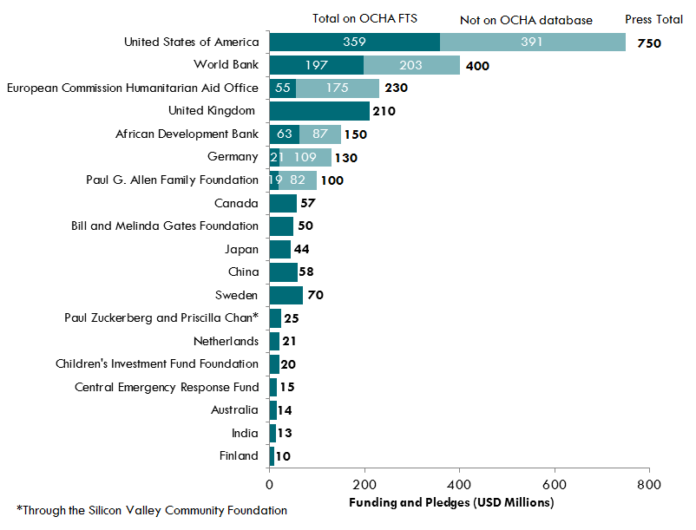How much is actually being spent on Ebola by donor governments, organizations, and private individuals? The short answer is that we don’t really know.
Related Blogs
We do know that the US government, the World Bank, and others are committing large amounts of money to Liberia, Guinea, and Sierra Leone through various channels such as the World Health Organization, UNICEF, the CDC, and bilateral aid to affected country governments. We also have UN OCHA’s Financial Tracking service, which is publishing regular updates with donors’ Ebola contributions.
However, compared to the pledges made in press releases, UN OCHA’s numbers come up short for several donors, as of October 24, 2014. The figure below illustrates this discrepancy, with the differences amounting to as much as $391 million in the case of the US government. The World Bank has committed up to $400 million, but UN OCHA’s database only accounts for around $197 million of this, even accounting for uncommitted pledges.

Sources for Press Numbers: Business Insider (US, World Bank, African Development Bank, UK, Germany, France, Canada, Gates Foundation, Japan, China, Mark Zuckerberg and Priscilla Chan, India), Paul G. Allen Family Foundation, Swedish Government (Sweden), European Commission Humanitarian Aid Office, Government of Netherlands (Netherlands), Children’s Investment Fund Foundation, Australia, Finland
Why this discrepancy between actual commitments and press announcements? One explanation is that the additional spending by governments goes through channels that UN OCHA’s financial tracking service does not cover. For instance, US allocations to the Department of Defense and Health and Human Services do not appear in the OCHA database, although their funding to USAID does. While this may be an explanation for the bilateral aid from country donors, the discrepancy between World Bank’s press and OCHA numbers is harder to pinpoint. Similarly, there are cases where press announcements seem to understate the actual spending and commitments by donors: Sweden appears to have funded and committed $37 million more than its last press announcement, whereas China has funded and committed $25 million more than it has announced (not shown in figure).
Better data and more accountability needed
The importance of reliable information about donor contributions in the aftermath of a crisis cannot be overstated. In an ongoing crisis, reliable and accurate information helps donors decide how to allocate funding in order to avoid overlap. However, it is difficult to assure accountability when it is impossible to match the total amounts in the press announcements with the actual money that has been allocated and spent in these countries.
UN OCHA’s overview of needs and requirements, which should serve as a real-time check for future commitments, has pinned the immediate needs and requirements across the region at $988 million. It also shows that spending and commitments on Ebola total $1.4 billion as of October 24; according to press releases of commitments for the top 20 donors, the total funding and pledges amount to more than $2.4 billion. Either way, the immediate needs seem to have been exceeded, and donors now need to think ahead for how best to allocate funds.
The lack of aid accountability in the aftermath of a crisis is an ongoing problem for the development community. The amount of aid given in the aftermath of Haiti’s 2010 earthquake is still difficult to quantify, and tracing US government funding down to the subcontractor remains next to impossible. A public health emergency such as the Ebola outbreak in West Africa faces largely similar risks when inflows of money are difficult to trace. Aid may be allocated inefficiently; contractors and subcontractors will not be held accountable for outcomes. Governments that already face the pressures of managing a developing economy often lack the infrastructure to manage these large inflows of cash. The onus for accountability therefore ought to be on the donors, not the recipient country governments that are in the midst of coping with an evolving emergency.
Releasing comprehensive, regular updates to the OCHA database would be a good first step, and should be considered a priority for all donors—if only to be sure that your press releases are accurate. But the UN OCHA database also needs to provide more detail about the allocation and use of funding to be most useful. Smarter allocation and greater accountability and evaluation are only possible if exact uses, locations, and recipients are known.
